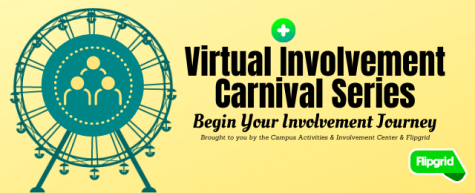Is your student organization ready for the Virtual Involvement Carnival 2020?
UNCW Clocktower.
SPONSORED POST
The annual Involvement Carnival is a one-stop resource for getting involved at UNCW and for recruiting new members into student organizations. This year’s Involvement Carnival, in a time of pandemic, will be unlike any other. How student organizations will make themselves stand out from the crowd could be a game-changer.
For decades, the second Wednesday in August has featured one of UNCW’s
largest, most flamboyant events on campus—the annual Involvement Carnival. With hundreds of s
tudent organizations, civic and religious groups, political organizations, local restaurants and retailers promoting themselves at tables assembled on the Campus Commons, thousands of people strolled t
he walks collecting information, tasting food samples, and meeting friends along the way. The Involvement Carnival has always been a richly colorful UNCW tradition that no one could ignore and no student should miss.
But how will this year’s Involvement Carnival operate in the age of face masks, hand sanitizer and social distancing? Exactly how the Virtual Involvement Carnival—or “VIC”—2020 will differ from the traditional version is nothing short of a sea change.
Darion Bayles, coordinator for campus activities & involvement with UNCW’s Department of Campus Life, said that “instead of the Involvement Carnival being one large, in-person carnival, it will be a series of 10 virtual carnivals, two per day, each of them themed.” Themes go by titles such as “Faith Fest,” “Discover Diversity,” “Stay Well,” “Dub Arts & Media,” and “Hobby Hour.”
According to Bayles, one of the greatest challenges of a virtual Carnival will be initial outreach. “With an in-person carnival, 300 tables on the Commons on a sunny day is hard to avoid. So one of our challenges is, how do we meet students right where they are? How do we get into their phones, into their rooms, into their day-to-day existence?”
He and his colleagues found an answer in Flipgrid, a social-learning platform where the VIC series will live. When students register their organizations for the virtual Carnival, instead of being assigned a physical table as in the past, now they are assigned a virtual table. “But they have to be creative,” Bayles said. “What do they put on their tables? Social media, interest forms, recruitment … how to make it digitally appealing? How to integrate their social m
edia? They’re able to add videos and photographs.”
For student organizations, he said, “The challenge will be how to branch out in their creativity.”

Leverage social media
“We are making our social media activity to engage future members,” said Taylor Currin, president of three UNCW student organizations—Sports Club Council, Club Tennis and the Association of PreOptometry Students. Currin is comfortable in the digital space, a real asset when you have three organizations depending on it.
Atlantis magazine’s approach will be, not surprisingly, design-heavy. Atlantis is UNCW’s student magazine of literature and the arts. “We use Adobe InDesign to make the magazine itself,” said Vasilios Moschouris, editor-in-chief of Atlantis, “and our social media coordinator uses Photoshop and InDesign to make ads for events on campus.” So transferring those skills to a virtual environment is not a high hurdle for them.
Moshcouris said that Atlantis has always relied heavily on digital marketing, and they’re not doing anything differently for this event. “We’re doing what we’ve always done, but even more,” he said. “All the work Atlantis produces is done online.” Marketing magazine has now become an even greater priority. Not only does Atlantis place ads in social media, he said, they also use them in email to key academic departments such as Creative Writing. “It makes it easier and more interesting for people to read.”
“Now that everything is moving more online, promoting on social media is becoming even more important than it was before,” he added. “It’s going to be a point of focus moving forward.”
Add a personal touch
For Dwayne Altman-Leach, president of UNCW’s National Panhellenic Council and vice-president of Alpha Phi Alpha fraternity, “The biggest challenge is, there’s no face-to-face connections. You can’t rely on your tone or gestures. You have to make it so [students] can do it without you being there.” And a personal touch, especially in a first interaction with new students, can mean the difference between a lasting connection and a student set adrift. An important feature that will allow a greater personal touch is that Flipgrid enables the video-meeting platform Zoom to be integrated into organizations’ virtual tables. Altman-Leach said his organizations will also be integrating Instagram and Zoom.
Students interested in a particular organization will be able to interact virtually face to face with members of the org and ask questions in real time. Tone of voice, expressions and gestures should deepen the experience and make it the next-best thing to being there in person.
Be creative
Integrating photography, audio and video, as well as static documents like brochures, flyers and forms, will be more likely to fire the imagination of students looking for organizations that inspire them to join.
Dwayne Altman-Leach has always produced flyers and other documents for his organizations’ activities. In a virtual environment, he’s conscious of the need to make everything notable. “We’ll be using pictures definitely,” he said. “So I use Photoshop and PostermyWall. Most of the things used for my chapter we make using Photoshop—flyers and things.” He finds Photoshop easy to make everything more vibrant. “Photoshop has really nice simple ways to do text. You can adjust a picture in so many ways, to make it look brighter,” he said.
Taylor Currin’s three organizations are posting videos on Flipgrid. “We are staying organized and creating a Flipgrid platform to display all our information. We are converting our normal display that we use at the in-person Involvement Carnival into a virtual presentation.”
Use the software you’re good at
Atlantis editor Moschouris used Photoshop and InDesign for his book-building class last semester. “I’m pretty familiar with it,” he said. So although he now has other magazine staff who do the design work, he understands its potential as they create content for the virtual carnival.
“I’m getting into the basic functions of Premiere Pro,” Altman-Leach said. “That’s probably my favorite. Even if you’re really not that advanced, you can get what you need done. You can add text, add photos, you can make things brighter. What makes it easy is, it has tutorials. You can get the basics to figure out how to edit things or change the sequence.”
Taylor Currin adds that his groups are creating PowerPoints to advertise and display information about themselves. “For my clubs, we use Microsoft Word, PowerPoint and Excel. I have used Adobe Creative Cloud to create a resume before. It is nice how you can pick from templates, create images, and do everything all in one place instead of using multiple applications to complete your work.”
Whether the innovation of a virtual Involvement Carnival will be permanent or just an artifact of the year 2020 remains to be seen. But distinguishing your organization—and building digital skills along the way—seems only like a good thing.
Adobe Creative Cloud can be a critical tool in creating uniquely engaging media. Creative Cloud includes apps like Photoshop, Illustrator, InDesign, and Premiere Pro, as well as all the productivity apps of Adobe Document Cloud to read, create, edit, and share PDFs. Creative Cloud allows students to create posters, flyers, and websites, to edit and share photos, to design page layouts or documents, and to create videos, documentaries, and more. Creative Cloud is free for all students at UNCW. Students can benefit from growing their skill set with Adobe to help them and their ideas stand out. Download now or click this link for more information.








